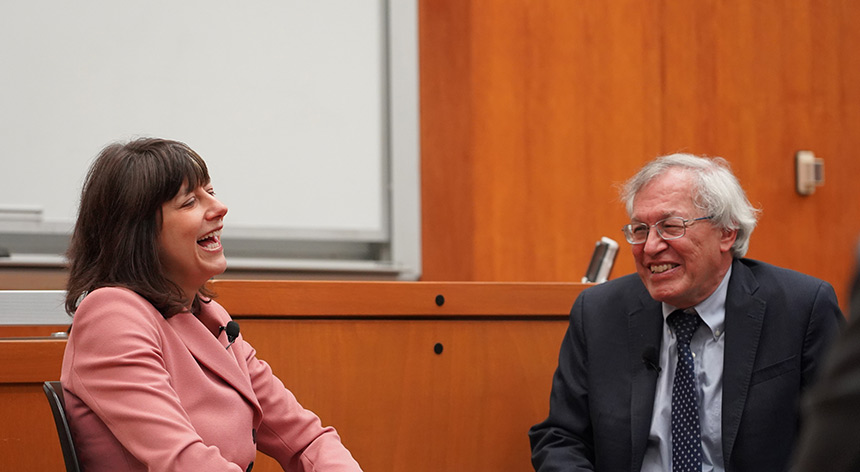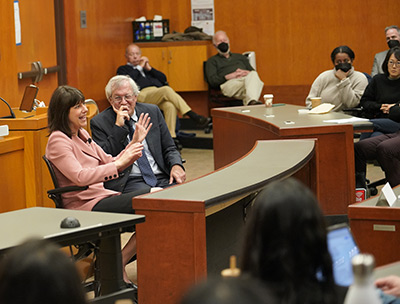
By Andrew Cohen
Among the many takeaways from U.S. Solicitor General Elizabeth Prelogar’s recent visit to a jam-packed Berkeley Law lecture hall: Having a serious job doesn’t mean you need to take yourself so seriously.
Yes, Prelogar is responsible for conducting and supervising all Supreme Court litigation on behalf of the United States. And yes, she determines whether the federal government will appeal judicial decisions that go against it, file an amicus curiae brief, or otherwise intervene in any appellate court.
But while discussing her rise to one of America’s most coveted law gigs with Berkeley Law Dean Erwin Chemerinsky, Prelogar also displayed ample humor and humility. Case in point: Describing her assignment as assistant special counsel to Robert Mueller’s investigation of Russian interference in the 2016 presidential election and related obstruction-of-justice issues.

“The most interesting job I’ve ever had that I can’t say anything about,” she said. “The impostor syndrome was very real. I was surrounded by expert prosecutors who told war stories over lunch recounting how many times they flipped a witness. I remember thinking, ‘I can’t even flip my kids to get them to cooperate, how is this going to go?’”
By all accounts, it’s gone exceedingly well. Prelogar excelled as Assistant to the Solicitor General from 2014 to 2019, briefing and arguing numerous cases in the Supreme Court and helping formulate the government’s appellate strategy in lower courts.
A former Fulbright Fellow and Harvard Law graduate, she hit a triple crown jackpot — clerking for Judge Merrick Garland of the U.S. Court of Appeals for the D.C. Circuit, then for Supreme Court Justices Ruth Bader Ginsburg and Elena Kagan.
“Judge Garland was brilliant at getting right to the heart of a case,” Prelogar said. “Justice Ginsburg was so meticulous. Clerks would prepare their opinions for her in triple or quadruple space to leave room for her edits. She was dedicated to making every word just right. Justice Kagan had never been a judge before, so really wanted to talk through the issues with her clerks and she’d grill us with amazing questions.”
Pursuing justice and autonomy
After clerking, Prelogar worked as an appellate associate at Hogan Lovell and became a partner at Cooley LLP, focusing on Supreme Court and appellate litigation, before moving to the public sector. Nominated as Solicitor General in August 2021 and confirmed later that year, Prelogar is only the second woman to serve in that role.
She noted how her office’s Supreme Court briefs differ from the private sector — tamping down the rhetoric and taking a more measured tone due to an ongoing institutional relationship with the court.
“I find it so rewarding that the cases come from across the appellate spectrum,” Prelogar said. “I also love having the chance to take ownership over my cases. I had a very good experience at law firms, but as a junior lawyer you don’t get that primary responsibility for developing case strategy and writing the briefs. I’ve now argued 19 Supreme Court cases, and it never gets old standing at the podium on behalf of my country.”

She told the audience there’s no substitute for preparation, and urged students to practice oral arguments and respond to potential questions out loud. Prelogar admitted that some cases she argues in the Supreme Court can be an uphill battle, but said she still believes there is room for effective advocacy.
“I can honestly say I’ve never gone into court thinking it’s entirely hopeless,” she said. “Even if we can’t get the outcome we want, we can at least guide the court to a better resolution and discussion of the issues than might have been. Your arguments aren’t always going to prevail, but I think there’s a real purpose and value to be served from approaching the job from that perspective.
“It’s natural to feel disappointment when a big case doesn’t come out the way you think it should, but I’d say the worst thing you can do with those feelings is give up hope and say it’s a lost cause … We’re lucky as lawyers to be developing skill sets to effect positive change in the world. A string of losses can make you feel dejected, but that’s how our arc of constitutional jurisprudence has developed. Sometimes it swings in the wrong direction, but advocates pushing in the other direction helps cause the pendulum to swing back. It makes a huge difference.”
Parting advice
Prelogar urged against emulating certain litigators, noting that courtroom success flows through authenticity. As a Supreme Court clerk, she attended every oral argument and saw a wealth of styles.
“Some turn the heat up in the room and are more forceful and animated — we call them ‘heaters,’” Prelogar said. “Then there are ‘coolers,’ who are more calm and professorial, who take the temperature down. What makes it effective is the sincerity involved, and knowing what worked for them. They say that argument is truth serum — you have to be yourself.”
While encouraging litigators to be comfortable in their own skin, her advice for law students was to consciously gravitate to unfamiliar things that make them uneasy.
“Some of the most rewarding experiences I’ve had were from pushing myself out of my comfort zone,” she said. “Don’t overlook opportunities that may feel like a stretch, because they can help you figure out the best way to use your talents in the law.”
In short: Sometimes steer clear of classes and projects that seem like an easy fit, but always lean toward those with whom you feel most connected.
“My most enduring law school memories are from the relationships I developed that were and continue to be incredibly enriching,” Prelogar said. “Go places where you will work with people you can respect, be open with, and learn from.”